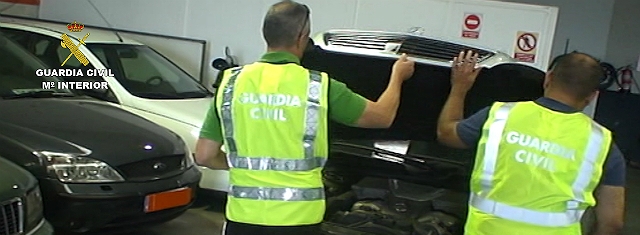Politics
The Spanish Civil Guard dismantled a network for defrauding 15 million in taxes
On vehicles purchased in the EU

(Source: Civil Guard)
USPA NEWS -
The Spanish Civil Guard has dismantled a network that had defrauded 15 million Euros in tax corresponding to the purchase of luxury vehicles from Germany, Holland and Belgium. It has arrested 10 people and has accused three others.
The organization used at least 30 trading companies, created for that purpose, that in five years would have handled about 105 million in operations, and which VAT shall not entered the public coffers. The investigations were initiated following a complaint lodged by the State Tax Administration Agency (AEAT its Spanish acronymun) in Castilla y Leon, which revealed the existence of a local resident of Magaz de Pisuerga, in the province of Palencia, North Spain, and other in Palencia capital that may be acquired vehicles in the European Union and, once in Spain, did not enter the public treasury shares corresponding VAT.
Following investigations, it was found a criminal group dedicated to purchasing vehicles in EU countries evading taxes. To do this, they used the classic scheme in this type of fraud, which consists of placing in the first step of importing the vehicle to a fraudulent operator, previously filed with the Registry of intra-Community operators, to simulate operations in the purchase of products European Union that in the case of intra-Community transactions are exempt from VAT.
This first Spanish operator called 'trout' and usually a limited company, with little or no capital, without establishment and workers, and its administrators or parents to usually insolvent subjects. Its function is to transfer vehicles through fictitious VAT invoices to other companies that act as a buffer screen before the action of Justice and the Treasury, but without declaring it or submit it to the Treasury.
The next step was to send vehicles businessman who had commissioned to sell to end users or other distributors in Spain, in a concerted action with the trout / screens companies. Thus, the VAT trout has not joined the Treasury is shared between all levels of the criminal chain. Sometimes it is intended to lower prices for cars, which represents unfair competition for companies that do meet their tax obligations.
The research was developed in three phases. In a first developed in early 2014 and in which the actions focused on Madrid, Segovia, Albacete, Toledo and Cordoba, were detected movements amounting to 83 million Euros and were involved 15 people and 12 companies. This phase coincided with a parallel research conducted by the delegation of the AEAT in Madrid and followed by the Court of Instruction No. 20 of the capital. This time, the data showed the participation of two more companies and bank transactions amounting to 13 million Euros, which would not have been detected, which would mean a total fraud of 2 million euros higher than initially accused.
The second phase, carried out earlier this year, revealed the existence of commercial transactions amounting to some 74 million Euros, which meant a fraud of some 10,250,000 Euros. After that, the Civil Guard proceeded to the arrest of 8 people in Madrid, Palencia, Navarra and Gijon, responsible for 14 companies. The third and final phase, developed in Madrid, Valencia and Palencia, performed last July, revealed the existence of four other companies related to the facts, which have been operating for more than 18 million Euros, which that would be a fraud 2,500,000 Euros. On this occasion, the agents proceeded to the arrest of two people and the attribution of three others.
Specialists Civil Guard have completed the operation having investigated 44 companies and 85 bank accounts, which has required study and analysis of thousands of bank transactions, as well as consideration of an immense amount of tax and commercial documentation, given the bulky number of companies and fiscal control exercises. It was also due to figure out the destination and origin of hundreds of vehicles, which has led to the conclusion that this operation is one of the most important in the field carried out in Spain.
Liability for this article lies with the author, who also holds the copyright. Editorial content from USPA may be quoted on other websites as long as the quote comprises no more than 5% of the entire text, is marked as such and the source is named (via hyperlink).





